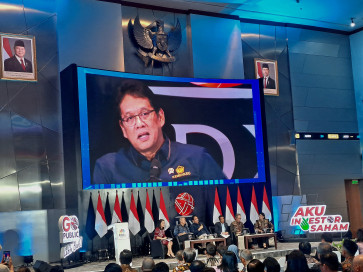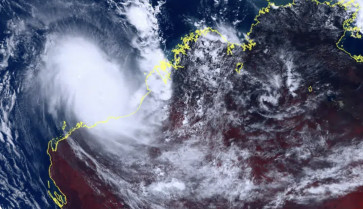Popular Reads
Top Results
Can't find what you're looking for?
View all search resultsPopular Reads
Top Results
Can't find what you're looking for?
View all search resultsGross-split scheme may hinder enhanced oil recovery
The government’s plan to implement a gross-split sliding scale in place of the current cost recovery system could hinder its efforts to encourage more exploration and exploitation activities that could boost oil and gas production
Change text size
Gift Premium Articles
to Anyone
T
he government’s plan to implement a gross-split sliding scale in place of the current cost recovery system could hinder its efforts to encourage more exploration and exploitation activities that could boost oil and gas production.
Unlike cost recovery, a reimbursement scheme for the upstream oil and gas sector, a gross-split scheme will incorporate a “no-reimbursement” mechanism, which will force companies to become more efficient amid continuously sluggish global oil prices.
The government hopes that the new scheme will be more desirable to investors as it will also involve variable and progressive split ratios that would change depending on different factors.
In the current scheme, in an oil project, a company’s portion is set at 15 percent and the rest is dedicated to the government, while in a gas project, the company has the right to a 30 percent portion.
However, experts are doubtful that the new scheme will encourage tertiary oil recovery methods such as enhanced oil recovery (EOR), which are essential to boost production amid depleting reserves.
National Energy Board (DEN) member Andang Bachtiar said forcing companies to become more efficient would make them shy away from using EOR and developing marginal fields because of the high costs and low internal rate of return (IRR).
Furthermore, companies working under a gross-split production sharing contract (PSC) would also prioritize production activities for guaranteed revenue rather than pay exploration activity costs.
“The General Plan for National Energy [RUEN] stipulates that in the next five years we have to boost production through EOR to reach 2.5 million barrels of oil stored in reserves,” he said.
The country’s oil production rates have continued to decrease over the years because of a lack of new discoveries. Data from the Upstream Oil and Gas Regulatory Special Task Force (SKKMigas) show that the nation’s proven oil reserves have dropped to 3,603 million stock tank barrels (mmstb) by the end of 2015 from 3,624 mmstb.
If the country continues to produce over 800,000 barrels of oil per day (bopd) without any new findings, its proven reserves could be depleted in little over a decade. Next year’s ready-to-sell production target is set at 815,000 bopd.
SKKMigas chairman Amien Sunaryadi claims that there is still around 48.6 billion stock tank barrels of oil (bstb), which could potentially be produced through EOR.
“This cannot be extracted through conventional methods and needs either EOR or extraction with chemical surfactants,” he said.
Despite the government’s enthusiasm for EOR, companies that have been conducting EOR pilot projects, such as Chevron Pacific Indonesia and Medco E&P Rimau, have said that these methods are still economically unfeasible to implement on a large scale unless global crude prices reach $80 per barrel. Benchmarks West Texas Intermediate (WTI) and Brent traded crude at around $55 per barrel recently.
The government has confirmed that the new scheme will be first implemented in the PSC of the Offshore Northwest Java (ONWJ) block. However, data from the Energy and Mineral Resources Ministry shows that there will still be around 50 existing PSCs, which will remain under the cost recovery scheme for the next 25 years.
Meanwhile, Adjie Harisandi, an industry analyst from Bank Mandiri, suggested that SKKMigas should still be able to control and monitor the cost of production of the contractors under the new scheme.
“Note that the government still has a legal right to collect income taxes from oil and gas in addition to oil-production sharing. Therefore, how much income tax the contractors must pay should be regulated as well,” he said in a recently published research note.










